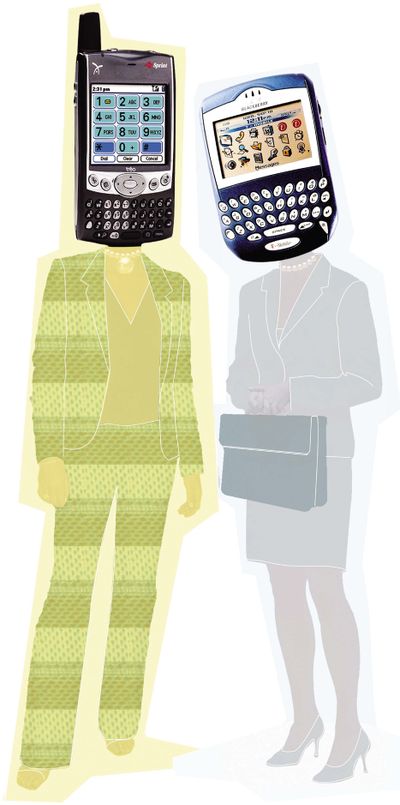Etiquette lines get blurred when PDAs interrupt conversations
Talking face to face seems to be taking a backseat to digital chats

Oh, no! He’s fading fast! Eyes drifting downward. Responses becoming monosyllabic. No! No, buddy! Pay attention! Did you hear the one about the foreclosed psychic? She was re-possessed. Ha, ha! Just stop that incessant thumb-typing, and give this exchange a chance!
Too late. The conversation is dead. It expired the moment the BlackBerry first vibrated.
Now all that you, the former half of two communicating people, can do is awkwardly stand there and deal with the fact that you are less engaging than a 5-ounce piece of plastic.
It’s maddening – or maybe it’s just a simple question of etiquette: What is the appropriate course of action when you have been abandoned for a Personal Digital Assistant?
“It’s a very anxious moment for me,” said Michael-Levon Warren, a designer in Washington, D.C.
After a while, he said, “I start to think, ‘Maybe I shouldn’t be standing here.’ But then I have to keep standing there because I didn’t walk away to begin with.”
Should you stay, or should you go?
Even trained professionals struggle with this question. Jodi Smith, the founder of Mannersmith Etiquette Consulting in Salem, Mass., describes a recent lunch with one pal who began texting four times in a 20-minute span.
Smith pointedly turned off her own cell phone. She explained that she’d been looking forward to uninterrupted conversation.
“But it was like a Pavlovian response. It was almost as if she was drooling” whenever the phone buzzed.
Finally, Smith moved to another table. When the friend came looking for her, full of promises and apologies, Smith was skeptical.
“Are you really done?” she asked. “You don’t have to be a pity friend.”
How offended we get. How we question our own self-worth.
“The first step is confusion,” said Pamela Eyring, director of the Protocol School of Washington, who has devised the four stages of BlackBerry abandonment.
In the confusion stage, the abandoned conversationalists are simply bewildered, Eyring said: “Why is this happening to me? Why aren’t they listening?”
After that is the uncomfortable phase. After discomfort comes irritation, and then, if the texting continues, outrage.
“That’s when you put up your defenses, and your facial expressions change,” Eyring said. “You lean back, and you just stare.
“It’s happening in business. It’s happening in families.”
The interaction doesn’t have to reach Stage 4.
“There is a forgiving side of the cycle,” Eyring said. It requires the offender to acknowledge that he is being a jerkface, and to signal that it will all be over soon.
The signal is where it gets tricky.
When people speak on the phone, their verbal cues – “Well, it’s been great chatting” – signal whether they’re wrapping up a conversation. There’s also the universal raised finger, meaning “Almost done,” or the vague pointing, meaning, “I’ll find you later.”
But there are no hand gestures with texting, because there are no free hands. And even though a verbal cue seems simple enough (“So sorry; just need to text my sister that I have her car”), most deluded offenders don’t offer one because they believe they are capable of both texting and smoothly carrying on a conversation. They are not.
PDA use exists in a pre-etiquette void. We do not yet have established gestures and rules for behavior.
For offenders: May you respond to an e-mail from your mother, or just your boss?
For victims: Should you pretend to suddenly get really engrossed in the menu, or whip a craft project out of your purse?
And can someone please develop a sign?
“Give me the talk-to-you-later signal!” Warren said. “Give me some kind of signal.”
Without an official rulebook, guidelines are individualized.
“Let’s say the person is someone I’ve just (started dating),” said Matt Rogers, a real estate agent. “Less than a minute of texting is OK; after that I’d walk.”
“What I do most often is pull out my own phone,” Jack Shapiro said.
“Oh, I can retaliate,” said Erin Lamos, who works at a Washington think tank. “I can be way more engrossed in my iPhone than anyone could be on their BlackBerry: ‘Excuse me while I use this iPhone app to play a song on my flute.’ ”
And what happens when one party gets tired of side-by-side typing and would like to tell the other person that it is time to resume conversation?
Mallory Grauer has a solution, having been in this situation more than once.
That’s when, she said helpfully, “You just send them a text.”